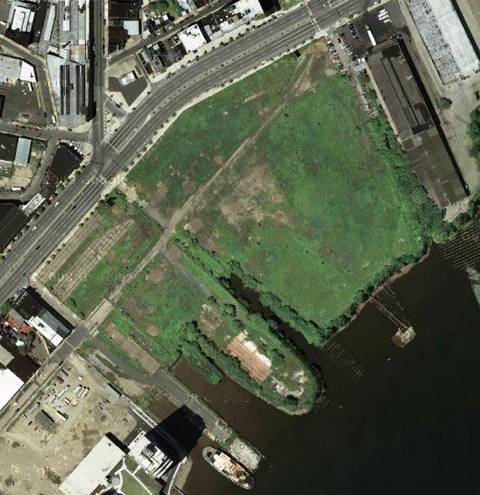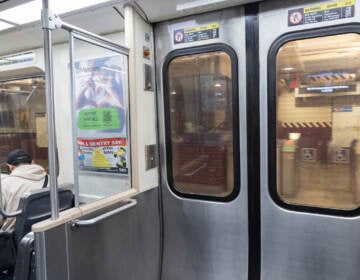Supremes get earful of riparian arguments

April 15
Previous coverage
By Kellie Patrick Gates
For PlanPhilly
The justices of the Pennsylvania Supreme Court Tuesday heard two hours of complex testimony that were intended to help them answer two questions: Did the City of Philadelphia have the power to grant a permit allowing SugarHouse Casino to build on the submerged lands of the Delaware River? If so, did it have the power to later revoke that permit?
That may be easier said than done.
SugarHouse’s attorney argues the legislature specifically granted the power to the city in a 1907 law that stands to this day, and the permit the city gave was not revocable.
But the City now agrees with a group of local state legislators and the members of city council that it never had the right to issue the permit, because The Dam Safety and Encroachments Act of 1978 revoked the power the legislature gave to the city through the 1907 law and specifically says only the state legislature can grant riparian rights.
However, if the city did have the power when it granted SugarHouse a permit, it also had the right to revoke the permit, attorneys for all three groups said.
The City’s change of heart does not prevent the justices from deciding it actually does have the power to grant riparian rights. The Court will issue a decision after reviewing the testimony and the reams of documents all the lawyers have filed. But at times, some of the justice’s questions and comments offered insight into what was on their minds as Tuesday’s proceeding unfolded.
Justice Seamus McCaffery expressed doubt that the legislature ever intended to take the ability to grant riparian rights away from Philadelphia. Justice Debra Todd noted that the City had changed its position several times since the matter was brought to the Court. Several justices – including Chief Justice Ronald Castille – seemed displeased with the assertion that the City had the right to revoke a license once it was granted, especially if the permit was the center of a case before the Court.
“You’re suggesting there would never be a final order in this case,” Justice Max Baer told Catherine M. Recker, an attorney representing City Council and the group of legislators. McCaffery said he could “envision the chaos every four years” if the city always had the option of revoking a permit it had issued.
Lawyers on all sides agreed that the right to grant permits to submerged, or riparian, lands exists with the legislature, unless the legislature explicitly grants that right to another entity.
Attorney Christopher Craig, representing the group of state legislators whose districts touch the Delaware River and City Council, said that in 1907, the legislature gave the city the ability to grant riparian rights within the city limits as a way for it to control shipping and make its port more competitive with that of New York City.
The law was never meant to apply to something not related to shipping, ports or commerce, he said, so even if it still stood, it would not apply to a casino. The City no longer owns a port, so the point of the 1907 act is moot. (During his testimony, SugarHouse attorney Stephen Cozen disagreed with this assessment, saying that a port structure is simply a structure located on a port.)
But, Craig said, the 1907 law – Act 321 – does not still stand, because the Encroachments Act specifically overturns all acts that conflict with it.
If the Court agrees, Craig said, it would not be taking any powers away from the city, as from the time the Encroachments Act was passed to last fall, when the Commerce Department gave SugarHouse a submerged lands license, the city never granted riparian rights. In fact, he said, the city went to the legislature whenever it needed riparian rights.
McCaffery questioned the assertion that the city has not granted riparian rights since 1978, saying he “believed” that 16 permits had been issued since then.
“The city has no record of any permits,” Craig told him.
But SugarHouse Attorney Steven Cozen also mentioned post-1978 permits during his testimony. Cozen
said former city solicitor Romulo Diaz had specifically stated in a note to Councilman Frank DiCicco that “lots of licenses have been issued along the river since 1978, but because they were destroyed in a fire in the 1980s, he couldn’t locate them.”
Said Cozen: “While the General Assembly always has the right to issue (riparian permits) the specific authority to issue a license within the city was delegated to the city, and remained in effect when (the permit was) granted, and to this day.”
McCaffery wondered why The Encroachments Act does not specifically state that Act 321 – the one that gave the city the ability to grant riparian rights – no longer existed. He pointed out that the Encroachments Act does list several other repealed laws by number, including Act 322, also passed in 1907, which allowed an agency called the Navigation Commission to issue permits for areas outside the city limits.
“Why not mention Act 321?” he asked Deputy City Solicitor Mark R. Zecca.
Zecca said there could be many reasons why the legislature did not chose to specifically eliminate Act 321. The Encroachment Act specifically says no body other than the legislature can grant riparian rights and that any law contradicting that is void. But maybe the legislature did not specifically repeal Act 321 because it wanted to leave the city with powers that did not contradict the law, such as the ability to issue essentially a construction permit for land along the shore.
But McCaffery wondered out loud if the legislature did not leave Act 321 on the books because it wanted Philadelphia to keep the powers it originally granted. “To me, maybe they intended to leave that alone,” he said.
In a conversation that took place several days before the hearing, Craig said that even if Act 321 was still valid, it would not apply to a casino, as that is not a harbor structure. In court, Craig said that the legislature may not have specifically repealed Act 321 because in the 1970s, the city still owned active ports. But that’s no longer the case, so “Its existing life is moribund at best.”
After Justice Debra Todd noted that the city has changed its riparian rights position several times Zecca, a deputy city solicitor, offered an explanation. He said that in fact, the city had returned to the position it had held for 30 years – until the end of the Street administration.
“In late fall, SugarHouse came to the City Solicitor with a novel idea no one in the city had ever dreamed of,” Zecca said. Diaz reviewed the facts and agreed with SugarHouse that the 1907 law gave the city the authority, and in the last days of former Mayor John Street’s administration, “there was a rush of activity to grant the licenses.”
Street wanted casinos built in Philadelphia to provide tax relief and spur development, and he did not take issue with their proposed waterfront location. Mayor Michael Nutter does not oppose casinos, but he does think they should be built elsewhere. But at first, “the new administration did not reject the (former) solicitor’s opinion,” Zecca said.
In January, the city revoked SugarHouse’s permit. Nutter said the process was flawed, but his administration still maintained they had the right to issue riparian permits. They said SugarHouse could appeal its decision. (SugarHouse did not see the need to appeal, since it maintains the city cannot revoke the permit.)
Then in February, when the state legislature passed laws granting riparian rights to two condo developments on the river, it included language reaffirming its sole authority to grant such rights. The new laws “sparked a re-examiniation of our whole position,” Zecca said, and the city concluded that it had made an error, and “we should return to our traditional opinion.”
So did the city have the right to revoke SugarHouse’s permit?
Recker, representing City Council and the legislators, said the bottom line is that the city never had the right to issue it in the first place, but for the sake of the matter before the court, she would present arguments assuming it did.
Both Recker and Zecca said this case was different from examples SugarHouse gave in court documents of situations in which the courts ruled that permits could not be revoked. The difference, they said, is that those cases involved private property, and this case involves public property.
Recker said that the legislature is actually obligated to continually review its decision when it grants the right to build on submerged lands, because these lands are public lands that belong to the people of the Commonwealth. If the legislature conveys the right to grant riparian rights to the city, then the city also gets the responsibility to review, she said, and the city was doing such a review when it determined the process that led to SugarHouse’s license was flawed.
But Cozen said that the permit granted by the city does not say it can be revoked, and revocation was never mentioned during the Commerce Department proceedings that led to its issuance. He also pointed out that SugarHouse has begun work that was only allowed as a result of the permit.
“The license cost $282,000,” Cozen said, adding that the city sent a check for that amount to HSP Gaming – the developer of SugarHouse Casino. “You can imagine what I told them to do with the refund check,” he said.
Justice Baer asked Recker if the city could revoke SugarHouse’s permit even after the casino was built.
“Should it become apparent that it is not in the interest of the public good, it could revoke it,” she said, citing a case from 1892 in which the Supreme Court found that the State of Illinois had the power to revoke a permit that allowed a railroad company to build on land next to the lake, even though the railroad had already completed significant work on its project..
The Court can’t stop the state – and by extension an entity to which it has conveyed the power to grant riparian rights – “from exercising its police power,” she said.
That statement did not sit well with Chief Justice Castille, who asked Recker over and over how the city could revoke a license when the issuance of that license was a matter before the Court.
“If it’s a matter before us, we can stop the state from doing anything,” he said.
After the proceeding, Mary Isaacson, spokeswoman for Rep. Michael O’Brien – one of the local legislators involved in the case – said that the court could have ordered that the city take no further action on the permit, if SugarHouse had requested that action be taken. But otherwise, the City was within its rights. “It’s not automatic,” she said.
Cozen insisted that the proceedings had everything to do with the proposed construction of casinos – a hot-button issue among the constituents of the elected officials.
But Craig asserted just as vehemently that it was not. He said that if the court says the city has the power to riparian rights, it would create a situation where any kind of development, including condominiums and hotels, could build on either river in Philadelphia without compensating the citizens of the Commonwealth and without state oversight.
Contact the reporter at kelliespatrick@gmail.com
WHYY is your source for fact-based, in-depth journalism and information. As a nonprofit organization, we rely on financial support from readers like you. Please give today.






